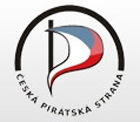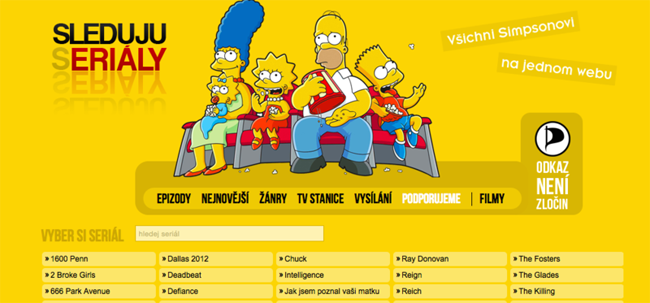Pirate Party’s Pirate Site Was Legal Under EU Law, Court Rules

Six years ago the Czech branch of the Pirate Party declared open war on a local anti-piracy outfit, opening several 'pirate' sites to draw fire from copyright holders. But, after being prosecuted in a criminal court last year, the matter has now been dropped after it was deemed the Pirates acted in accordance with a recent landmark EU ruling.

In July 2011, the Czech division of the Pirate Party reacted angrily when a local anti-piracy outfit targeted a 16-year-old who they accused of posting links to infringing content.
Under the slogan “Linking is not a Crime” the party launched Tipnafilm.cz, its own pirate movie download site, quickly followed by another indexing 5,800 titles.
“We challenge the Anti-Piracy Union to stop bullying the under-aged and to aim its preposterous claims at the Pirate Party,” the pirates said at the time.
In a declaration of “open war,” the Czech Pirates went on to launch TV-focused site Sledujuserialy.cz (I Watch TV Series). That provoked a response from the Anti-Piracy Union, and in January 2016 the party became the subject of a criminal prosecution, which they welcomed with open arms.
Sledujuserialy.cz – I Watch TV Series

“Our goal is to change the copyright monopoly law so that people are not fined millions for sharing culture with their friends. However, until we achieve that, we will fight in courts over interpretation and enforcement of the law,” the party said.
But now, a year later, the action against the party has fizzled out. Despite offering 1,205 videos without permission from copyright holders and standing accused of causing hundreds of thousands of dollars in losses, the Prague District Court has stopped the prosecution in its tracks.
After consulting EU case law, particularly the landmark GS Media ruling in the Netherlands, it was found that since the Pirates ran their site without generating revenue, they weren’t in violation of the law.
“The sledujuserialy.cz website was non-commercial. Therefore the owner of the website does not have the obligation to check the ‘legality of hyperlinks’ on his website, i.e. we did not have to check whether the content was online legally,” party spokesman Mikulas Ferjencik informs TorrentFreak.
“Unfortunately, if our website was commercial we would have to check it. The good thing about the current decision is that it specifies ‘non-commercial’ pretty broadly, i.e. no financial profit for us.”
While the absence of revenue played its part, the problems for the Pirates’ adversaries did not stop there.
Although the Czech Anti-Piracy Union (CPU) complained to the Pirate Party about links to copyrighted content present on their site, it failed to provide evidence that it was authorized to act on behalf of copyright holders whose content was allegedly being infringed.
“The court stated that a random letter from anyone is not good enough to make us obliged to take down the links even if it is from the CPU, which is notorious for enforcing harsher copyright law,” Ferjencik says.
“However, they provided this evidence to the court in the criminal procedure. This means we cannot put the website back online so easily, as we would have to remove hyperlinks to illegal sources first, as we now officially know these are illegal sources.”
Under same GS Media EU ruling, knowingly linking to infringing content, even without commercial interests, is illegal.
Commenting on this week’s ruling, party vice-president Jakub Michálek says that the value of hyperlinks shouldn’t be understated and anti-piracy outfits shouldn’t overreach.
“If we want a working digital economy, where also the artists make money, we cannot turn sharing of a hyperlink on a video a crime. This ruling is important for legal certainty of all Internet users as it states that you do not infringe copyright by linking unless you know that the content was uploaded illegally,” Michálek said.
“The court also confirmed that the Czech Anti-Piracy Union cannot act as the Internet Police and they cannot ask other actors to take down content, without providing evidence that they act on behalf of the copyright owners.”
Party chairman Ivan Bartos says that the criminal prosecution is proof that rightsholders are clinging to their old business models, which appear to be doing rather well, despite piracy.
“We view the whole case as a fight between a modern and backward understanding of the world and digital reality. The criminal prosecution is proof that the old structures do not want to innovate. Instead, they rely on their old business models, which do not have much to do with reality,” Bartos says.
“Last year, 13 million people went to the Cinema in the Czech Republic, it is the highest number in the last five years. If this is the result of piracy – and I believe it is – the filmmakers should thank us instead of suing us.”
The decision of the Prague court (pdf) is not yet final and the public prosecutor could still file an appeal.